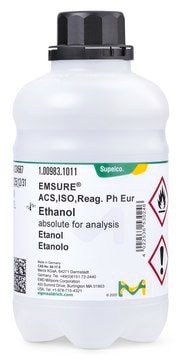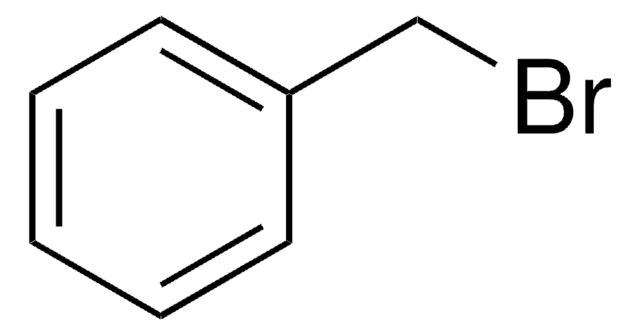L010002
Acetonitrilo
Sinónimos:
ACN, Cianometano, Cianuro de metilo, Nitrilo de etilo
About This Item
Productos recomendados
densidad de vapor
1.41 (vs air)
presión de vapor
72.8 mmHg ( 20 °C)
tpo
for DNA synthesis
formulario
liquid
temp. de autoignición
973 °F
lim. expl.
16 %
condiciones de almacenamiento
dry at room temperature
impurezas
≤30 ppm water content (Karl Fischer)
color
clear
índice de refracción
n/D 1.342-1.346
n20/D 1.344 (lit.)
bp
81-82 °C (lit.)
mp
−45 °C (lit.)
solubilidad
water: soluble (completely)
densidad
0.786 g/mL at 25 °C (lit.)
formato
neat
cadena SMILES
CC#N
InChI
1S/C2H3N/c1-2-3/h1H3
Clave InChI
WEVYAHXRMPXWCK-UHFFFAOYSA-N
¿Está buscando productos similares? Visita Guía de comparación de productos
Otras notas
Palabra de señalización
Danger
Frases de peligro
Clasificaciones de peligro
Acute Tox. 4 Dermal - Acute Tox. 4 Inhalation - Acute Tox. 4 Oral - Eye Irrit. 2 - Flam. Liq. 2
Código de clase de almacenamiento
3 - Flammable liquids
Clase de riesgo para el agua (WGK)
WGK 2
Punto de inflamabilidad (°F)
35.6 °F - closed cup
Punto de inflamabilidad (°C)
2.0 °C - closed cup
Elija entre una de las versiones más recientes:
¿Ya tiene este producto?
Encuentre la documentación para los productos que ha comprado recientemente en la Biblioteca de documentos.
Nuestro equipo de científicos tiene experiencia en todas las áreas de investigación: Ciencias de la vida, Ciencia de los materiales, Síntesis química, Cromatografía, Analítica y muchas otras.
Póngase en contacto con el Servicio técnico








